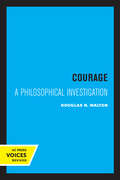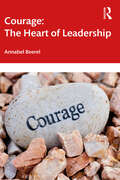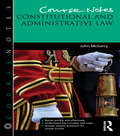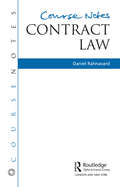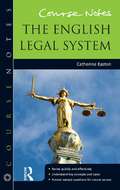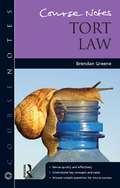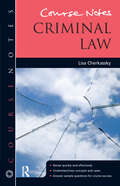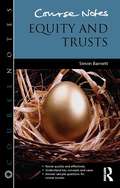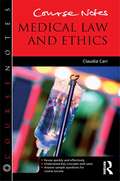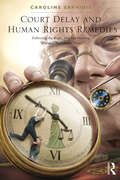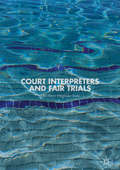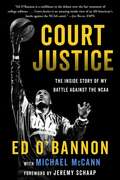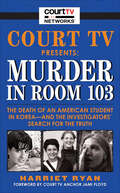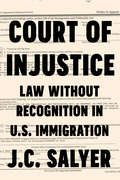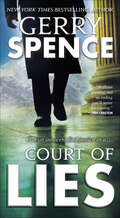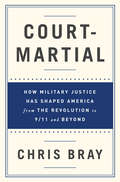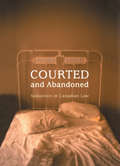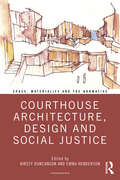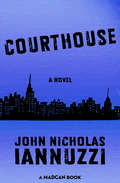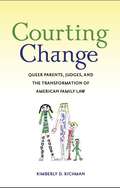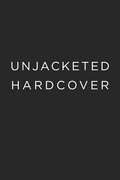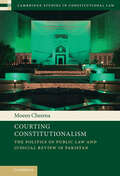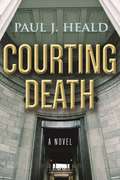- Table View
- List View
Courage: A Philosophical Investigation
by Douglas N. WaltonThis title is part of UC Press's Voices Revived program, which commemorates University of California Press’s mission to seek out and cultivate the brightest minds and give them voice, reach, and impact. Drawing on a backlist dating to 1893, Voices Revived makes high-quality, peer-reviewed scholarship accessible once again using print-on-demand technology. This title was originally published in 1986.
Courage: The Heart of Leadership
by Annabel BeerelCourage lies at the heart of leadership. Leaders need courage to make wise decisions, not self-interested ones. They need to be able to set aside their egos, to feel vulnerable, to face challenges, yet remain principled and hold the course. This book presents many suggestions on how to make a real difference in organizations, and explains how one can develop the courage to be an effective leader, step by step.The book is designed to give leaders the self-awareness and the tools to overcome the obstacles that prevent us from leading effectively. Leadership requires working through the systemic barriers that serve as forcefields pulling and pushing us in various directions. Drawing on interviews with over 20 organizational leaders in a variety of industries, the book helps leaders to address key areas that are rarely discussed: the personal baggage attached to authority, self-esteem and self-differentiation, ego management, and the terror of the group. It highlights – with examples – how fear impairs our ability to make good decisions, and how our tendency to reactivity and the quick fix vitiates our attempts at being courageous. The hallmark of courage is the ability to have courageous conversations that invite transformation.The book is ideal reading for organizational leaders who are seeking ways to break through some of the personal and systemic barriers to leading with purpose in a way that makes a real difference.
Course Notes: Constitutional And Administrative Law (Course Notes)
by John McGarryCourse Notes is designed to help you succeed in your law examinations and assessments. Each guide supports revision of an undergraduate and conversion GDL/CPE law degree module by demonstrating good practice in creating and maintaining ideal notes. Course Notes will support you in actively and effectively learning the material by guiding you through the demands of compiling the information you need. Written by expert lecturers who understand your needs with examination requirements in mind Covers key cases, legislation and principles clearly and concisely so you can recall information confidently Contains numerous diagrams, definition boxes, workpoints, and other features to help you understand difficult concepts Provides opportunities throughout for you to check your understanding Additional online revision guidance such as sample essay plans, interactive quizzes and a glossary of legal terms at www.unlockingthelaw.co.uk
Course Notes: Contract Law (Course Notes)
by Daniel RahnavardThe ideal companion to developing the essential skills needed to undertake the core module of contract law as part of undergraduate study of law or a qualifying GDL/CPE conversion course. Providing support for learning and revision throughout, the key skills are demonstrated in the context of the core topics of study with expertly written example sets of notes, followed by opportunities to learn and test your knowledge by creating and maintaining your own summaries of the key points. The chapters are reinforced with a series of workpoints to test your analytical, communication and organisational skills; checkpoints, to test recall of the essential facts; and research points, to practice self-study and to gain familiarity with legal sources. 'Course Notes: Contract Law' is designed for those keen to succeed in examinations and assessments with view to taking you one step further towards the development of the professional skills required for your later career. In addition, concepts are set out both verbally and in diagrammatic form for clarity, and the essential case law is displayed in a series of straightforward and indisposable tables illustrating how best to analyse and compare legal points as expressed by the opinions of the authorities in each case.To check your answers to questions examples are provided online along with sample essay plans and web links to useful web sites and sources as part of the ever popular resources at www.unlockingthelaw.co.uk, making this the ideal resource to guide you through the demands of compiling and revising the information you will need for your exams.
Course Notes: Course Notes: The English Legal System (Course Notes)
by Catherine EastonThe ideal companion to developing the essential skills needed to undertake the core module of English Legal System as part of undergraduate study of law or a qualifying GDL/CPE conversion course. Providing support for learning and revision throughout, the key skills are demonstrated in the context of the core topics of study with expertly written example sets of notes, followed by opportunities to learn and test your knowledge by creating and maintaining your own summaries of the key points. The chapters are reinforced with a series of workpoints to test your analytical, communication and organisational skills; checkpoints, to test recall of the essential facts; and research points, to practice self-study and to gain familiarity with legal sources. "Course Notes: the English Legal System" is designed for those keen to succeed in examinations and assessments with view to taking you one step further towards the development of the professional skills required for your later career. In addition, concepts are set out both verbally and in diagrammatic form for clarity, and the essential case law is displayed in a series of straightforward and indisposable tables illustrating how best to analyse and compare legal points as expressed by the opinions of the authorities in each case.To check your answers to questions examples are provided online along with sample essay plans and web links to useful web sites and sources at www.unlockingthelaw.co.uk, making this the ideal resource to guide you through the demands of compiling and revising the information you will need for your exams.
Course Notes: Course Notes: Tort Law (Course Notes)
by Brendan GreeneCourse Notes is designed to help you succeed in your law examinations and assessments. Each guide supports revision of an undergraduate and conversion GDL/CPE law degree module by demonstrating good practice in creating and maintaining ideal notes. Course Notes will support you in actively and effectively learning the material by guiding you through the demands of compiling the information you need. • Written by expert lecturers who understand your needs with examination requirements in mind • Covers key cases, legislation and principles clearly and concisely so you can recall information confidently • Contains easy to use diagrams, definition boxes and work points to help you understand difficult concepts • Provides self test opportunities throughout for you to check your understanding • Illustrates how to compile the ideal set of revision notes • Covers the essential modules of study for undergraduate llb and conversion-to-law GDL/CPE courses • Additional online revision guidance such as sample essay plans, interactive quizzes and a glossary of legal terms at www.unlockingthelaw.co.uk
Course Notes: Criminal Law (Course Notes)
by Lisa CherkasskyThe ideal companion to developing the essential skills needed to undertake the core module of criminal law as part of undergraduate study of law or a qualifying GDL/CPE conversion course. Providing support for learning and revision throughout, the key skills are demonstrated in the context of the core topics of study with expertly written example sets of notes, followed by opportunities to learn and test your knowledge by creating and maintaining your own summaries of the key points. The chapters are reinforced with a series of workpoints to test your analytical, communication and organisational skills; checkpoints, to test recall of the essential facts; and research points, to practice self-study and to gain familiarity with legal sources. "Course Notes: Criminal Law" is designed for those keen to succeed in examinations and assessments with view to taking you one step further towards the development of the professional skills required for your later career. In addition, concepts are set out both verbally and in diagrammatic form for clarity, and the essential case law is displayed in a series of straightforward and indisposable tables illustrating how best to analyse and compare legal points as expressed by the opinions of the authorities in each case.To check your answers to questions examples are provided online along with sample essay plans and web links to useful web sites and sources at www.unlockingthelaw.co.uk, making this the ideal resource to guide you through the demands of compiling and revising the information you will need for your exams.
Course Notes: Equity And Trusts (Course Notes)
by Simon BarnettCourse Notes is designed to help you succeed in your law examinations and assessments. Each guide supports revision of an undergraduate and conversion GDL/CPE law degree module by demonstrating good practice in creating and maintaining ideal notes. Course Notes will support you in actively and effectively learning the material by guiding you through the demands of compiling the information you need. • Written by expert lecturers who understand your needs with examination requirements in mind • Covers key cases, legislation and principles clearly and concisely so you can recall information confidently • Contains easy to use diagrams, definition boxes and work points to help you understand difficult concepts • Provides self test opportunities throughout for you to check your understanding • Illustrates how to compile the ideal set of revision notes • Covers the essential modules of study for undergraduate llb and conversion-to-law GDL/CPE courses.
Course Notes: Medical Law And Ethics (Course Notes)
by Claudia CarrCourse Notes is designed to help you succeed in your law examinations and assessments. Each guide supports revision of an undergraduate and conversion GDL/CPE law degree module by demonstrating good practice in creating and maintaining ideal notes. Course Notes will support you in actively and effectively learning the material by guiding you through the demands of compiling the information you need. • Written by expert lecturers who understand your needs with examination requirements in mind • Covers key cases, legislation and principles clearly and concisely so you can recall information confidently • Contains easy to use diagrams, definition boxes and work points to help you understand difficult concepts • Provides self test opportunities throughout for you to check your understanding • Illustrates how to compile the ideal set of revision notes • Covers the essential modules of study for undergraduate llb and conversion-to-law GDL/CPE courses • Additional online revision guidance such as sample essay plans, interactive quizzes and a glossary of legal terms at www.unlockingthelaw.co.uk
Court Delay and Human Rights Remedies: Enforcing the Right to a Fair Hearing 'Within a Reasonable Time'
by Caroline SavvidisThis book brings legal and academic perspective to the theory and practice surrounding the right to a fair hearing within a reasonable time. This field of rights has been somewhat neglected academically, a fact which jars with the sheer volume of case law budding from this single, simple, fundamental right, bearing testimony to the widespread concern with delay in judicial proceedings which transcends the boundaries of states or legal systems. The work provides a blueprint for analysing the effectiveness of legal remedies across entire legal systems, as well as in any given individual case. The first part focuses on deriving legal principles from the body of jurisprudence of the European Court of Human Rights in Strasbourg, while the second part contains illustrations of the practical application of such principles. The content constitutes essential reading for students, academics, lawyers, judges, practitioners and all those who wish to understand the issue of delay in judicial proceedings, and the legal context of available remedies. The author aims to raise awareness about the human rights issues which come into play when delivery of justice is delayed, and to provide both an academic and practical reference.
Court Interpreters and Fair Trials
by John Henry Dingfelder StoneGlobalization has increased the number of individuals in criminal proceedings who are unable to understand the language of the courtroom, and as a result the number of court interpreters has also increased. But unsupervised interpreters can severely undermine the fairness of a criminal proceeding. In this innovative and methodological new study, Dingfelder Stone comprehensively examines the multitudes of mistakes made by interpreters, and explores the resultant legal and practical implications. Whilst scholars of interpreting studies have researched the prevalence of interpreter error for decades, the effect of these mistakes on criminal proceedings has largely gone unanalyzed by legal scholars. Drawing upon both interpreting studies research and legal scholarship alike, this engaging and timely study analyzes the impact of court interpreters on the right to a fair trial under international law, which forms the minimum baseline standard for national systems.
Court Justice: The Inside Story of My Battle Against the NCAA
by Edward C. O'Bannon Michael A. McCannIn 2009, Ed O’Bannon, once a star for the 1995 NCAA Champion UCLA Bruins and a first-round NBA draft pick, thought he’d made peace with the NCAA’s exploitive system of “amateurism.” College athletes generated huge profits, yet―training nearly full-time, forced to tailor coursework around sports, often pawns in corrupt investigations―they saw little from those riches other than revocable scholarships and miniscule chances of going pro. Still, that was all in O’Bannon’s past…until he saw the video game NCAA Basketball 09. As avatars of their college selves―their likenesses, achievements, and playing styles―O’Bannon and his teammates were still making money for the NCAA. So, when asked to fight the system for players past, present, and future―and seeking no personal financial reward, but rather the chance to make college sports more fair―he agreed to be the face of what became a landmark class-action lawsuit. <p><p> Court Justice brings readers to the front lines of a critical battle in the long fight for players’ rights while also offering O’Bannon’s unique perspective on today’s NCAA recruiting scandals. From the basketball court to the court of law facing NCAA executives, athletic directors, and “expert” witnesses; and finally to his innovative ideas for reform, O’Bannon breaks down history’s most important victory yet against the inequitable model of multi-billion-dollar “amateur” sports.
Court Reporting: Bad Grammar Good Punctuation Workbook
by Margaret Wakeman WellsA language arts workbook for court reporting
Court TV Presents: The Death of An American Student in Korea—And the Investigators Search for the Truth
by Harriet RyanA true crime account of the mysterious death of a foreign exchange and the South Korean and U.S investigators attempts to find the murderer. Exchange student Jamie Penich left her small Pennsylvania hometown to see the world, but her journey ended with a brutal attack in a shabby motel room in Seoul, South Korea, where the raven-haired 21-year-old was found naked and stomped to death. Investigators zeroed in on soldiers, turning out barracks and trolling seedy bars for the GIs who partied with Jamie in the hours leading up to her death. But every lead produced only new mysteries. There were unbreakable alibis, a roommate who claimed she had slept through the crime, and lab tests that hinted at a secret lover. The investigation seemed destined for the cold case file until a high-powered American senator pressed for answers. Soon, a greenhorn detective settled on a shocking new suspect, a pretty blonde exchange student named Kenzi Snider. During an interrogation, the teenager confessed to killing Jamie during a lesbian encounter . . . but it was what happened next that was truly surprising.What really happened in Room 103?“Chilling . . . sensational.” —Tucson Citizen, Arizona
Court of Injustice: Law Without Recognition in U.S. Immigration
by J.C. SalyerCourt of Injustice reveals how immigration lawyers work to achieve just results for their clients in a system that has long denigrated the rights of those they serve. J.C. Salyer specifically investigates immigration enforcement in New York City, following individual migrants, their lawyers, and the NGOs that serve them into the immigration courtrooms that decide their cases. This book is an account of the effects of the implementation of U.S. immigration law and policy. Salyer engages directly with the specific laws and procedures that mandate harsh and inhumane outcomes for migrants and their families. Combining anthropological and legal analysis, Salyer demonstrates the economic, historical, political, and social elements that go into constructing inequity under law for millions of non-citizens who live and work in the United States. Drawing on both ethnographic research conducted in New York City and on the author's knowledge and experience as a practicing immigration lawyer at a non-profit organization, this book provides unique insight into the workings and effects of U.S. immigration law. Court of Injustice provides an up-close view of the experiences of immigration lawyers at non-profit organizations, in law school clinics, and in private practice to reveal limitations and possibilities available to non-citizens under U.S. immigration law. In this way, this book provides a new perspective on the study of migration by focusing specifically on the laws, courts, and people involved in U.S. immigration law.
Court of Lies: A Novel
by Gerry SpenceFrom Gerry Spence, one of America’s greatest trial attorneys and the New York Times bestselling author of How to Argue and Win Every Time, comes an explosive courtroom thriller of murder, passion, and the twists and treachery of law and justice. Lillian Adams is going on trial for the murder of her wealthy husband before Judge John Murray, to whom she has been like a daughter since childhood. Despite this long, shared history, both the prosecutor and defense attorney agree that Murray should sit on the case, and Murray himself knows he must. For he believes that if he steps down and another judge is appointed, there will be little hope for Lillian. The prosecutor is a sadistic psychopath who will pervert the law to convict Lillian and do everything in his power to hurt Judge Murray. And Murray must save Lillian.Gerry Spence takes readers through shocking twists and suspenseful courtroom scenes that only the great maestro of the courtroom himself could create. Court of Lies goes beyond being a great legal thriller. It questions the very basis of our legal system and its ability to discover the truth and deliver justice.At the Publisher's request, this title is being sold without Digital Rights Management Software (DRM) applied.
Court-Martial: How Military Justice Has Shaped America from the Revolution to 9/11 and Beyond
by Chris BrayA timely, provocative account of how military justice has shaped American society since the nation's beginnings. With a great eye for narrative, historian Chris Bray (himself a former soldier) tells the sweeping story of military justice from the institution of the court martial in the earliest days of the Republic to contemporary arguments over how to use military courts to try foreign terrorists or soldiers accused of sexual assault. Bray recounts the stories of famous American court martials, including those involving President Andrew Jackson, Gen. William Tecumseh Sherman, Lt. Jackie Robinson, and Pvt. Eddie Slovik; he explores how encounters of freed slaves with the military justice system during the Civil War anticipated the Civil Rights movement; and he explains how the Uniform Code of Military Justice came about after World War II. Throughout, he shows that the separate justice system of the armed forces has often served as a proxy for America's ongoing arguments over equality, privacy, discrimination, security, and liberty.
Courted and Abandoned
by Patrick BrodeA pregnancy outside of marriage was a traumatic event in frontier Canada, one that had profound legal implications, not only for the mother, but also for the woman's family, the alleged father, and for the entire community. Patrick Brode examines the history of the 'heartbalm' torts in nineteenth-century Canada - breaches of duty leading to liability for damages for seduction, breach of promise of marriage, and criminal conversation - that were part of the inherited English law and were a major feature of early Canadian law.Encompassing all ten Canadian provinces, Brode's study examines the court cases and the communities in which they arose. He illustrates the progression of these 'heartbalm' actions as women gained more and more autonomy in the late nineteenth century, until questions arose as to the applicability of these feudal remedies in a modern society. He argues that the heartbalm cases are a testament to how early Canadians tried to control sexuality and courtship, even consensual activity among adults. In mixing legal and social issues, and showing how they interact, Courted and Abandoned makes a significant contribution to legal history, women's studies, and cultural history.
Courthouse Architecture, Design and Social Justice
by Emma Henderson Kirsty DuncansonThis collection interrogates relationships between court architecture and social justice, from consultation and design to the impact of material (and immaterial) forms on court users, through the lenses of architecture, law, socio-legal studies, criminology, anthropology, and a former high court judge. International multidisciplinary collaborations and single-author contributions traverse a range of methodological approaches to present new insights into the relationship between architecture, design, and justice. These include praxis, photography, reflections on process and decolonising practice, postcolonial, feminist, and poststructural analysis, and theory from critical legal scholarship, political science, criminology, literature, sociology, and architecture. While the opening contributions reflect on establishing design principles and architectural methodologies for ethical consultation and collaboration with communities historically marginalised and exploited by law, the central chapters explore the textures and affects of built forms and the spaces between; examining the disjuncture between design intention and use; and investigating the impact of architecture and the design of space. The collection finishes with contemplations of the very real significance of material presence or absence in courtroom spaces and what this might mean for justice. Courthouse Architecture, Design and Social Justice provides tools for those engaged in creating, and reflecting on, ethical design and building use, and deepens the dialogue across disciplinary boundaries towards further collaborative work in the field. It also exists as a new resource for research and teaching, facilitating undergraduate critical thought about the ways in which design enhances and restricts access to justice.
Courthouse: A Novel
by John Nicholas IannuzziThe blistering novel of a courageous young lawyer in a big-city jungle of mob violence, corrupt courts, political intrigue, and dangerous passion! In the hushed halls of justice, Marc Conte was dynamite. From quiet air-conditioned courtrooms to seething New York streets, Courthouse follows Conte--the city's brightest young criminal lawyer--as he grapples with the most dangerous adversaries a lawyer ever faced: corrupt DAs and crooked judges; political backstabbers who could end a young lawyer's career for good; and women willing to do anything for his services. Ahead of Conte are his three most challenging cases--and a slashing confrontation with the seamy side of the American legal system. With all the explosive reality of the passions it portrays, Courthouse propels the reader into the tumultuous world of Marc Conte, trial lawyer.
Courting Change: Queer Parents, Judges, and the Transformation of American Family Law
by Kimberly D. RichmanWinner of the 2010 Pacific Sociological Association Distinguished Contribution to Scholarship AwardA lesbian couple rears a child together and, after the biological mother dies, the surviving partner loses custody to the child’s estranged biological father. Four days later, in a different court, judges rule on the side of the partner, because they feel the child relied on the woman as a “psychological parent.” What accounts for this inconsistency regarding gay and lesbian adoption and custody cases, and why has family law failed to address them in a comprehensive manner?In Courting Change, Kimberly D. Richman zeros in on the nebulous realm of family law, one of the most indeterminate and discretionary areas of American law. She focuses on judicial decisions—both the outcomes and the rationales—and what they say about family, rights, sexual orientation, and who qualifies as a parent. Richman challenges prevailing notions that gay and lesbian parents and families are hurt by laws’ indeterminacy, arguing that, because family law is so loosely defined, it allows for the flexibility needed to respond to—and even facilitate — changes in how we conceive of family, parenting, and the role of sexual orientation in family law.Drawing on every recorded judicial decision in gay and lesbian adoption and custody cases over the last fifty years, and on interviews with parents, lawyers, and judges, Richman demonstrates how parental and sexual identities are formed and interpreted in law, and how gay and lesbian parents can harness indeterminacy to transform family law.
Courting Conflict: The Israeli Military Court System in the West Bank and Gaza
by Lisa HajjarThis book provides a rare look at an institution that lies both figuratively and literally at the center of the Israeli-Palestinian conflict. Lisa Hajjar has conducted in-depth interviews with dozens of Israelis and Palestinians--including judges, prosecutors, defense lawyers, defendants, and translators--about their experiences and practices to explain how this system functions, and how its functioning has affected the conflict.
Courting Constitutionalism: The Politics of Public Law and Judicial Review in Pakistan (Cambridge Studies in Constitutional Law)
by Moeen CheemaOver the last decade, the Supreme Court of Pakistan has emerged as a powerful and overtly political institution. While the strong form of judicial review adopted by the Supreme Court has fostered the perception of a sudden and ahistorical judicialisation of politics, the judiciary's prominent role in adjudicating issues of governance and statecraft was long in the making. This book presents a deeply contextualised account of law in Pakistan and situates the judicial review jurisprudence of the superior courts in the context of historical developments in constitutional politics, evolution of state structures and broader social transformations. This book highlights that the bedrock of judicial review has remained in administrative law; it is through the consistent development of the 'Writ jurisdiction' and the judicial review of administrative action that Pakistan's superior courts have progressively carved an expansive institutional role and aggrandised themselves to the status of the regulator of the state.
Courting Death
by Carol S. SteikerRefusing to eradicate the death penalty, the U.S. has attempted to reform and rationalize capital punishment through federal constitutional law. While execution chambers remain active in several states, Carol Steiker and Jordan Steiker argue that the fate of the American death penalty is likely to be sealed by this failed judicial experiment.
Courting Death: A Novel (The\clarkeston Chronicles Ser. #3)
by Paul HealdFrom an internationally recognized law professor comes the third legal thriller in an exciting mystery series, the Clarkeston Chronicles.Courting Death finds Melanie Wilkerson (from Cotton, book two of the Clarkeston Chronicles) and Arthur Hughes working uncomfortably together in the chambers of a famous federal judge. While Melanie neglects her duties as a law clerk to investigate the mysterious death of a young woman in the courthouse five years earlier, Arthur wades through the horrific habeas corpus appeals of two prisoners: an infamous serial killer and a pathetic child murder.Melanie, a Georgia native who returns from law school in the Northeast, hoped to establish a legal reputation that will eclipse her beauty pageant queen past, which she is now desperate to disown. Arthur is a bright but naive Midwesterner who is rapidly seduced by the small Georgia college town of Clarkeston which, to his surprise, comes with an exotic and attractive landlady. The cohort of federal court clerks is completed by Phil Jenkins, a Stanford graduate from San Francisco who tries his best to balance the personalities of his volatile colleagues.Living and working in bucolic Clarkeston comes with a price. In Courting Death, Arthur, Melanie, and Phil are confronted with the extremes of human mortality, both in and outside the legal system, in ways that they could never have expected or prepared for.Skyhorse Publishing, as well as our Arcade, Yucca, and Good Books imprints, are proud to publish a broad range of books for readers interested in fiction-novels, novellas, political and medical thrillers, comedy, satire, historical fiction, romance, erotic and love stories, mystery, classic literature, folklore and mythology, literary classics including Shakespeare, Dumas, Wilde, Cather, and much more. While not every title we publish becomes a New York Times bestseller or a national bestseller, we are committed to books on subjects that are sometimes overlooked and to authors whose work might not otherwise find a home.
